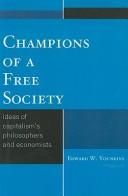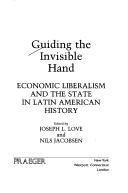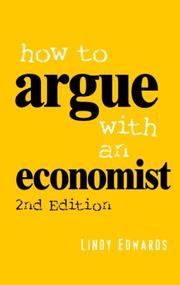| Listing 1 - 10 of 242 | << page >> |
Sort by
|
Book
ISBN: 0582296714 9780582296718 Year: 1985 Publisher: London Longman
Abstract | Keywords | Export | Availability | Bookmark
 Loading...
Loading...Choose an application
- Reference Manager
- EndNote
- RefWorks (Direct export to RefWorks)
Economic order --- Economic sociology --- Political sociology --- Capitalism --- Laissez-faire --- Industry and state --- Industrial policy

ISBN: 0739126474 0739130536 9780739130537 1299785875 9781299785878 9780739126479 9780739126486 0739126482 Year: 2008 Publisher: Lanham Lexington Books
Abstract | Keywords | Export | Availability | Bookmark
 Loading...
Loading...Choose an application
- Reference Manager
- EndNote
- RefWorks (Direct export to RefWorks)
This book is written for individuals who want to learn about the philosophical foundations of political and economic freedom. It is an introduction and a guide to the principal theoretical ideas on liberty produced by the most influential and creative thinkers in history, with chapters on Adam Smith, Ludwig von Mises, and Carl Menger.
Capitalism --- Free enterprise --- Economics --- Free markets --- Laissez-faire --- Markets, Free --- Private enterprise --- Economic policy --- Philosophy.
Book
ISBN: 9292577441 9292577433 Year: 2017 Publisher: Metro Manila, Philippines : Asian Development Bank,
Abstract | Keywords | Export | Availability | Bookmark
 Loading...
Loading...Choose an application
- Reference Manager
- EndNote
- RefWorks (Direct export to RefWorks)
Free enterprise --- Free markets --- Laissez-faire --- Markets, Free --- Private enterprise --- Economic policy --- Pacific Area --- Economic policy.

ISBN: 0275929450 9780275929459 Year: 1988 Publisher: New York Praeger
Abstract | Keywords | Export | Availability | Bookmark
 Loading...
Loading...Choose an application
- Reference Manager
- EndNote
- RefWorks (Direct export to RefWorks)
Economisch liberalisme --- Free enterprise --- Laissez faire, laissez passer --- Liberalisme [Economisch ] --- Libre entreprise --- Libéralisme économique --- Ondernemingsvrijheid --- Vrije markt --- Vrije onderneming --- Vrijemarkteconomie --- Free markets --- Laissez-faire --- Markets, Free --- Private enterprise --- Economic policy --- Latin America --- Economic policy. --- Latin America - Economic policy. --- Free enterprise.
Book
ISBN: 1501756907 1609091973 9781609091972 0875804985 9780875804989 9781501756900 Year: 2020 Publisher: Ithaca, NY
Abstract | Keywords | Export | Availability | Bookmark
 Loading...
Loading...Choose an application
- Reference Manager
- EndNote
- RefWorks (Direct export to RefWorks)
"In the depths of a depression in 1894, a highly successful Gilded Age businessman named Jacob Coxey led a group of jobless men on a march from his hometown of Massillon, Ohio, to the steps of the nation's Capitol. Though a financial panic and the resulting widespread business failures caused millions of Americans to be without work at the time, the word unemployment was rarely used and generally misunderstood. In an era that worshipped the self-reliant individual who triumphed in a laissez-faire market, the out-of-work "tramp" was disparaged as weak or flawed, and undeserving of assistance. Private charities were unable to meet the needs of the jobless, and only a few communities experimented with public works programs. Despite these limitations, Coxey conceived a plan to put millions back to work building a nationwide system of roads and drew attention to his idea with the march to Washington. In Coxey's Crusade for Jobs, Jerry Prout recounts Coxey's story and adds depth and context by focusing on the reporters who were embedded in the march. Their fascinating depictions of life on the road occupied the headlines and front pages of America's newspapers for more than a month, turning the spectacle into a serialized drama. These accounts humanized the idea of unemployment and helped Americans realize that in a new industrial economy, unemployment was not going away and the unemployed deserved attention. This unique study will appeal to scholars and students interested in the Gilded Age and US and labor history"--
Labor --- Unemployment --- Working class --- Unemployed --- History --- Coxey, Jacob Sechler, --- Coxey's Army. --- populism, laissez-faire market, Masillon Ohio, Jacob Coxey.
Book
ISBN: 9789079481033 Year: 2011 Volume: 2 Publisher: Antwerpen Murray Rothbard Institute
Abstract | Keywords | Export | Availability | Bookmark
 Loading...
Loading...Choose an application
- Reference Manager
- EndNote
- RefWorks (Direct export to RefWorks)
Economic schools --- Economisch liberalisme --- Free enterprise --- Laissez faire, laissez passer --- Liberalisme [Economisch ] --- Libre entreprise --- Libéralisme économique --- Ondernemingsvrijheid --- Vrije markt --- Vrije onderneming --- Vrijemarkteconomie --- Liberalisme (19e eeuw) --- solidariteit --- 301.18

ISBN: 2251410058 9782251410050 Year: 1992 Publisher: Paris Les Belles Lettres
Abstract | Keywords | Export | Availability | Bookmark
 Loading...
Loading...Choose an application
- Reference Manager
- EndNote
- RefWorks (Direct export to RefWorks)
Political philosophy. Social philosophy --- Libertarianism --- Sociological jurisprudence --- Laissez faire --- Libertarianisme --- Sociologie juridique --- Liberté --- Individualisme --- Propriété --- Libre entreprise --- sociologie --- liberalisme --- economie --- psychologie --- Free enterprise.
Book
ISBN: 1944424512 9781944424510 9781944424503 Year: 2017 Publisher: Washington, D.C.
Abstract | Keywords | Export | Availability | Bookmark
 Loading...
Loading...Choose an application
- Reference Manager
- EndNote
- RefWorks (Direct export to RefWorks)
When we stop to consider it, a free economy is a marvel. Millions of people, mostly unknown to one another, each producing some particular good or service, somehow manage to coordinate their actions in a vast, cooperative, productive order with no one in charge. How does it work? Economics helps us understand and this introduces the concepts on which all of economics is founded.
Economics. --- Free enterprise. --- Free markets --- Laissez-faire --- Markets, Free --- Private enterprise --- Economic policy --- Economic theory --- Political economy --- Social sciences --- Economic man
Book
ISBN: 0255367775 0255367783 9780255367776 9780255367769 Year: 2019 Publisher: London, England : Institute of Economic Affairs,
Abstract | Keywords | Export | Availability | Bookmark
 Loading...
Loading...Choose an application
- Reference Manager
- EndNote
- RefWorks (Direct export to RefWorks)
Liberalism. --- Economic history. --- Free enterprise. --- Free markets --- Laissez-faire --- Markets, Free --- Private enterprise --- Economic policy --- Economic conditions --- History, Economic --- Economics --- Liberal egalitarianism --- Liberty --- Political science --- Social sciences

ISBN: 9780511481666 9780521699433 9780511296581 0511296584 0511295812 9780511295812 0511292643 9780511292644 0521699436 0511481667 1107173574 9781107173576 9786610959723 6610959722 1139132997 9781139132992 0511295049 9780511295041 0511294247 9780511294242 128095972X Year: 2007 Publisher: Cambridge, UK New York Cambridge University Press
Abstract | Keywords | Export | Availability | Bookmark
 Loading...
Loading...Choose an application
- Reference Manager
- EndNote
- RefWorks (Direct export to RefWorks)
This fascinating book reflects on how economics has become central to our lives, and how the 'economic rationalist' perspective has become the lens through which all matters in Australian public life are viewed. It explains how this economic worldview systematically overlooks important social issues and how it transforms Australian culture. How to Argue with an Economist invites a broad general audience into debates that were once reserved for experts. Lindy Edwards, a former economic adviser in the Prime Minister's Department, has a talent for expressing concepts simply. She distils economics' key ideas into a lively and enjoyable read, explaining how economists think and then how you can argue with them.
Free enterprise --- Australië --- economische politiek --- markteconomie --- Free markets --- Laissez-faire --- Markets, Free --- Private enterprise --- Economic policy --- Australia --- Economic policy. --- Politics and government --- Business, Economy and Management --- Economics
| Listing 1 - 10 of 242 | << page >> |
Sort by
|

 Search
Search Feedback
Feedback About UniCat
About UniCat  Help
Help News
News